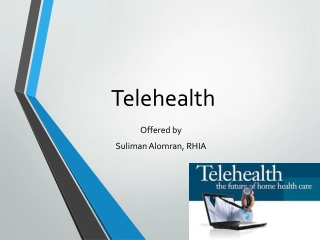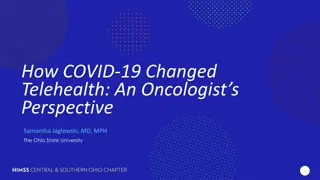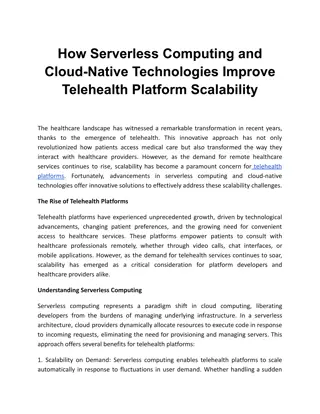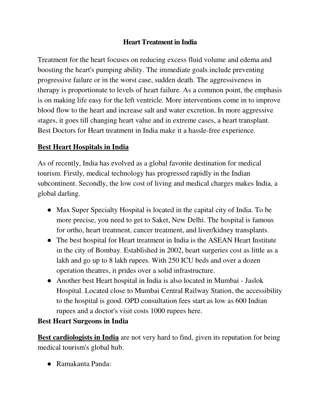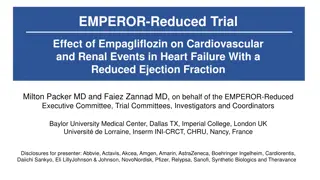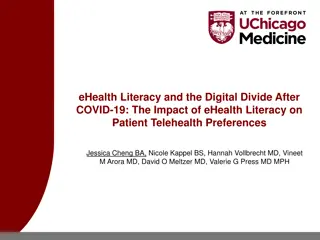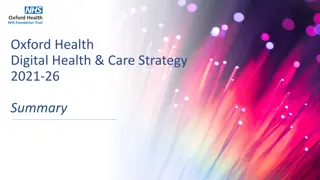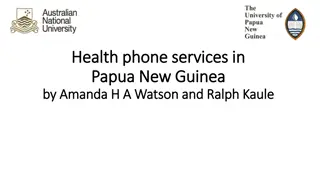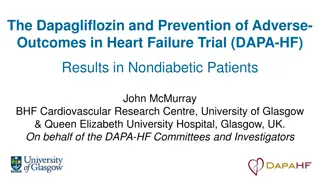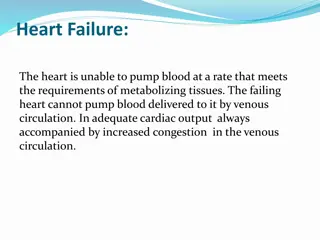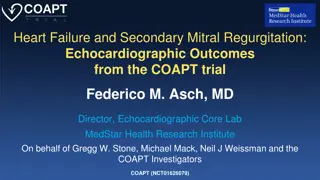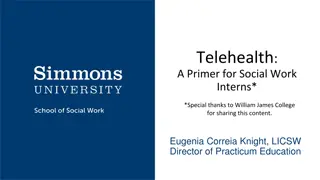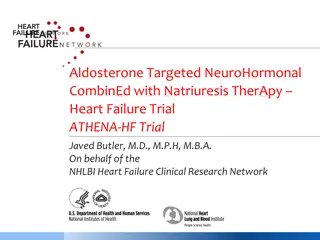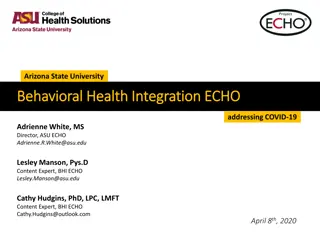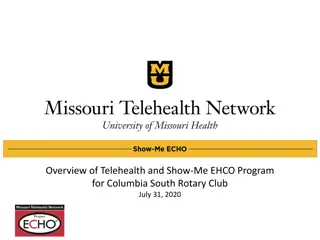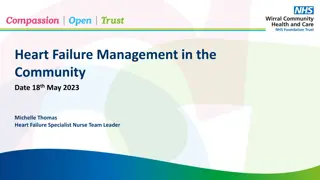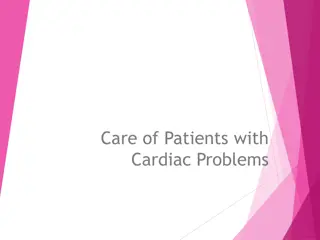Telehealth in Heart Failure Management: Improving Outcomes through Digital Solutions
Research indicates that telehealth programs play a significant role in managing chronic heart failure, leading to reduced all-cause mortality, decreased hospitalizations, and improved quality of care. Studies highlight the effectiveness of telehealth in monitoring symptoms, enhancing patient outcomes, and reducing healthcare utilization. Nurse-led titration of medications further enhances the comprehensive care approach in heart failure management.
Download Presentation

Please find below an Image/Link to download the presentation.
The content on the website is provided AS IS for your information and personal use only. It may not be sold, licensed, or shared on other websites without obtaining consent from the author. Download presentation by click this link. If you encounter any issues during the download, it is possible that the publisher has removed the file from their server.
E N D
Presentation Transcript
Me Care Mobile Enabled Care Heart Failure Medication Titration using Telehealth GP Case Conference Chris Horton Nurse Practitioner
Research reduce all cause mortality, reduce in hospitalisations, and reduce LOS. Meta analysis and meta-regression of telehealth programmes for patients with chronic heart failure. (Rui, X. Lin, Li. & Sheena X, L. 2013). 33 RCT s, 26 tele- monitoring, 7 Case Management or telephone-based monitoring. 7530 patients. Meta analysis showed telehealth programmes had significant overall effectiveness in reducing all-cause mortality (fixed effect model risk ratio 0.76, 95% CI 0.66 to 0.88), reduced CHF related hospitalisations and LOS. Greater effectiveness in reducing mortality and hospitalisations among patients with higher NYHA categories. Symptoms data reduce mortality rate by 34% and hospitalisation by 15%. Clinical effectiveness in adding questionnaires (symptom monitoring) adding biometrics enhanced telehealth.
Research Studies poor quality knowledge, self efficacy, self care using telehealth. A Systematic review of the mediating role of knowledge, self efficacy and self care behaviour in telehealth patients with heart failure. (Ciere, Y. Cartwright, M. & Newman S. 2012. 18:384-391. Journal of Telemedicine and Telecare. N=12 studies met criteria, system of home based self monitoring of signs and symptoms of HF that transferred the data for remote assessment to health care providers. Researchers looked at 6 pathways how telehealth may influence knowledge and self efficacy, knowledge influences self care, self efficacy influences self care, telehealth influences self care and self care influences patient outcomes. Outcomes showed that studies were of poor quality in examining the cognitive and behavioural mediators in the area of knowledge, self efficacy, self care using telehealth. The researchers were unable to prove a causal pathway between TH and key outcomes
Research lower risk all cause mortality using Health Buddy, cost effectiveness more studies. Impact of a Telehealth and care management program on All Cause Mortality and Healthcare Utilization in Patients with Heart Failure. Kao, D. Lindenfeld, J. Macaulay, D et al.(2016) Vol 22. No 1. 2-11. Telemedicine and e-Health. Health Buddy Programme. Content driven telehealth system coupled with care management. Retrospective cohort study, n=623. Results 24.9% lower risk adjusted all cause mortality over 3 years of follow up (HR =0.75; 95% CI, 0.63-0.89; p=0.001). Fewer hospitalisations if used this system. Health effectiveness and cost effectiveness of telehealth care for heart failure: study protocol for a RCT. (2016) Lebech Cichosz, S. Holger Ehlers, L. Hejlesen, O. Telekit solution tablet Samsung. Health related QOL, Cost effectiveness, changes in mortality and in physiological indicators. Await publishing. Telehealth for the Digital Illiterate Elderly Heart Failure Patients Experiences (2014) Lind, L & Karlsson, D. online open access. Digital pen with camera used on paper, strokes made by the pen are recorded and transferred via mobile internet server. Health Diary Form.
Research Nurse Led titration Nurse-led titration of angiotensin converting enzyme inhibitors, beta adrenergic blocking agents, and angiotensin receptor blockers for people with reduced ejection fraction (Review), Driscoll, A. Currey, J & Krum, H. 2015 Issue 12 Art. No: CD009889 www.cochranelibrary.com Compared nurse titration of BB, ACEIs, and ARB s with titration of medications by GP. 7 RCT s,(1684) participants, residential care, primary care and outpatient clinics. 4 studies 556 participants, NLT group experienced a lower rate of all-cause hospital admissions (RR 0.51, 95% CI 0.72 to 0.88, high quality evidence) and fewer hospitalisations related to heart failure (RR 0.51, 95% CI 0.36 to 0.72, moderate- quality evidence) compared to usual care. 6 studies 902 participants, examined all cause mortality. All-cause mortality was also lower in the NLT group (RR 0.66, 95% CI 0.48 to 0.92) compared to usual care. 5 studies 966 participants were reported to reach target dose of beta blocker (NLT)
West Moreton Health Provides health service to Ipswich and rural areas of Boonah, Esk, Laidley and Gatton. Broad Service goals are: Patient Centred Care Implementing evidence based guidelines for Cardiac Rehabilitation, Heart Failure, Lung Disease, Diabetes and other chronic diseases (Me Care). Providing care closer to home. Decrease preventable hospitalisations Interconnect care with General Practitioners
Telemonitoring via MeCare (Mobile Enabled Care) Partnership between WMH and Phillips Health care (2016). MeCare is a home monitoring Bluetooth system to better manage the growing burden of chronic disease. Focus on the top 5% high cost patients. Aim to interrupt the chronic disease cycle of deterioration, exacerbation and crisis. Patients submit biometric and psycho-social data through clinical software monitored by a multidisciplinary team.
Me Care Outcomes 170 patients monitored, have a case manager health coach. Reduction of 17% in hospital bed days (450 bed days). 60% reduction in ED presentations. 27% decrease in inpatient costs. 28% decrease in potentially preventable hospitalisations.
Heart Failure Medication Titration using Telehealth Heart Failure Service Model Process of Telehealth Occasions of service Outcomes Learnings
WMH-Heart Failure Service Model In-reach to Ipswich Hospital. Follow up HF patients on discharge. Some education given in hospital, mostly self care management covered once the patient is in the community. Patient referrals accepted from Tertiary hospitals, rural hospitals, GP s, self referral, internal CCS referral. We see public and private patients. Nursing Staff CNC FTE, CN X2 FTE, RN x1 FTE, NP FTE. Case management model. Access to all Allied Health and Pharmacist per referral. HF Gym with the Exercise Physiologist who also will do some home visits and telehealth consultation. Nurses see patients in Clinics, home visits, phone follow up, telehealth, case conferences with GP. Our team is well supported by Cardiologists at Ipswich Hospital and we have direct communication for troubleshooting clinical problems.
NP Engagement and Process for Telehealth Usually identify patients at HF Clinic or HF Titration Clinic. Discuss with patient about the process of telehealth and gain consent. Discussed with Telehealth team and rural facilities equipment: designated computers with camera s and sound disc s, template for consultation, suitable booking arrangements for both sites, appointment letter for patient, obtaining patient chart from hospital and biometrics required from rural site. Preferred quiet clinic room, access to programmes eg Viewer, Elms, Emdat, private pathology. Referral process for allied health support for patients at rural hospitals. Arrange pathology and write prescriptions, liaise with local pharmacy. Rural hospital will fax through ECG or other tests results. Documentation of interview to rural site. Letter to GP. Rebooking process
Occasions of Service for Telehealth 4/11/2016 to 2/7/2018 Total of 20 patients Occasions of Service Esk 40 FTA 10% Boonah 47 Cancellations 17 Canc 15% Esk 35% FTA 11 Consults 2ndweekly or monthly Duration 6-9 months Boonah 41% Esk Boonah Cancellations FTA
OUTCOMES CONTINUE DISCHARGED PATIENTS 20 15 2 (3) Patients Hospitalised (1) MeCare CHANGED TO CLINIC (2) AND HOME VISIT (1)
Outcomes - medications 20 Patients ACEI or ARB full dose 4 Highest Tolerated BB Highest Tolerated ACEI or ARB = 12 14 20 Beta Blocker full dose 6 Action Plan Entresto MRA full dose 7 3 2 SIDE EEFECTS ACEI Issues: Low Blood Pressure and poor renal function.
Outcomes - Financial & Travel Received incentive funding for Travel from Boonah to Ipswich is 46 telehealth 2016-2017 back to WMH kms each way, equal 92 kms by 47 approximately $350 new patient and episodes of care, equals 4324 kms $315 review patient. saved for patients. Calculated $200 per consultation per Travel from Esk to Ipswich is 64 kms site for Activity Based Funding. each way, equals 128 kms by 40 OOS $9400 to Boonah Hospital 47 equals 5120 kms saved for patients. episodes of care. Total of 9444 kms saved in travel $8000 to Esk 40 episodes of care. time. $17,400 to Ipswich CCS July 2018 HHS will receive Tier 2 funding for telehealth.
Patient Survey Patient survey indicated telehealth was suitable for management of their condition. Best thing about using telehealth is that they didn t need to travel far. Location, appointment process, meeting rural community nurse and consultation with NP were all satisfactory
Staff Survey Process for arranging telehealth at your hospital was suitable. Equipment was suitable Assessment requirements were clear prior to telehealth Notification of the telehealth outcomes occurred. Best thing about telehealth patients love it, so accessible. Assessing and preparing patients I feel confident. Heart Sounds can be difficult to assess. Would like more training.
Learnings Meet patients beforehand for rapport Be aware that sensitive issues may and assessment by NP if suitable for not always suit telehealth. telehealth. What is the risk to Support to community nurses in decompensate? building rapport, knowledge and skills. Awareness of hearing problems, Be clear in expectations of memory problems, complexity of assessments prior to consultation. multimorbidity. Be respectful of nurse s time in rural Is the patient a good self manager? setting. Do they understand the medications May need to change mode of consult and capable of changing doses? to home visit or clinic. Are they likely to attend appointments, Important to keep the GP up to date have blood tests? with medication changes. Do they have support? Are they linked Case Review if time. with a GP?
GP Case Conference Developed a model for case conference with GP s. Can be via telehealth camera and sound device at GP clinic. Also Telehealth portal using PEXIP on mobile device. 3 pathways Complex multi-morbid patients requiring specialist support by GP (need another health professionals plus specialist is claim medicare CC) Supportive Palliative pathway Aged care Pathway Arrange times in regular clinic first in morning or first after lunch suits GP. Set aside 30 -40 minutes. Aim is to embed in normal practice CCS.
References Meta analysis and meta-regression of telehealth programmes for patients with chronic heart failure. (Rui, X. Lin, Li. & Sheena X, L. 2013). A Systematic review of the mediating role of knowledge, self efficacy and self care behaviour in telehealth patients with heart failure. (Ciere, Y. Cartwright, M. & Newman S. 2012. 18:384-391. Journal of Telemedicine and Telecare Impact of a Telehealth and care management program on All Cause Mortality and Healthcare Utilization in Patients with Heart Failure. Kao, D. Lindenfeld, J. Macaulay, D et al.(2016) Vol 22. No 1. 2-11. Telemedicine and e-Health.
References Health effectiveness and cost effectiveness of telehealth care for heart failure: study protocol for a RCT. (2016) Lebech Cichosz, S. Holger Ehlers, L. Hejlesen, O. Telehealth for the Digital Illiterate Elderly Heart Failure Patients Experiences (2014) Lind, L & Karlsson, D. online open access Nurse-led titration of angiotensin converting enzyme inhibitors, beta adrenergic blocking agents, and angiotensin receptor blockers for people with reduced ejection fraction (Review), Driscoll, A. Currey, J & Krum, H. 2015 Issue 12 Art. No: CD009889 www.cochranelibrary.com


